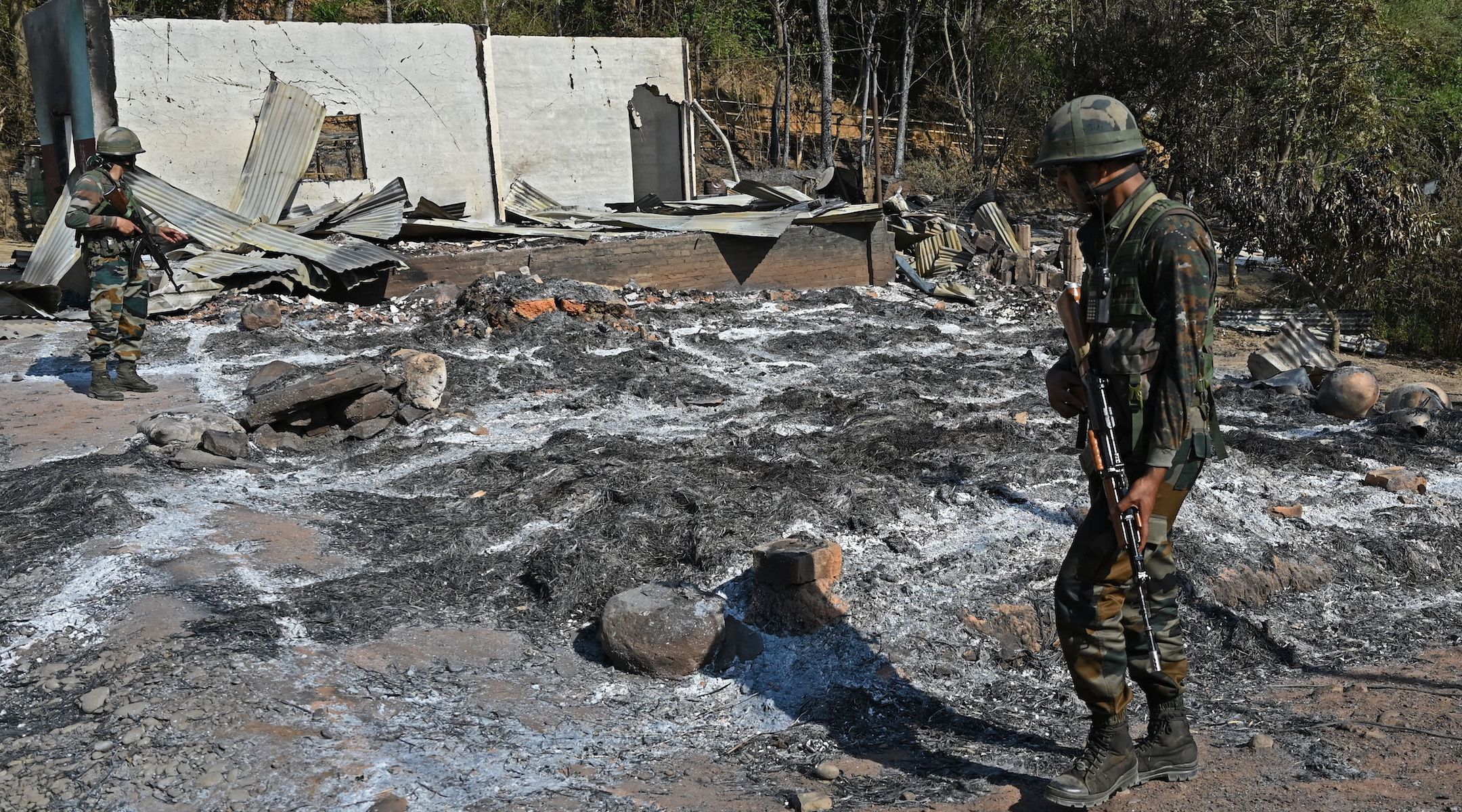Israel’s foreign minister cuts India visit short as Jews caught in crossfire of violent clashes
‘It is time for Israel to act and bring them home to the Jewish state before more Bnei Menashe Jews are killed,’ said the leader of an organization that works with Indian Jews

Indian army soldiers inspect the remains of a house that was set on fire by a mob in an area of a village in the Senapati district of India’s Manipur state, May 8, 2023. (Arun Sankar/AFP via Getty Images)
(JTA) — India’s small Bnei Menashe community is reeling after a member was killed and a synagogue was burned during violent clashes in the country’s northeast.
Some members of the community, practicing Jews who are seeking to move to Israel, have sought shelter at paramilitary camps, according to Isaac Thangjom, a Jew from the area who now lives in Israel. He said the situation is “very grim,” conditions are “squalid” and food and aid are scarce.
“It’s anarchy,” Thangjom told the Jewish Telegraphic Agency last week. “They’re specifically targeting Kuki [tribe members] and calling us foreigners, telling us to ‘go back to Burma.’”
Bnei Menashe sources in Manipur, where the violence took place, were unreachable as the government suspended internet service in the region. Jewish community members in Mizoram, the nearby region which is also home to several small communities of Bnei Menashe Jews, said it had not been affected.
A planned visit to India by Israel’s foreign minister, Eli Cohen, was cut short on Tuesday because of a military operation in Israel. Cohen had not been planning to visit Manipur, the region where the violence took place, and Israel’s Ministry of Aliyah and Integration did not return requests for comment or questions about whether he would address the violence during his visit. His planned agenda included inaugurating a “Jewish Trail” in Mumbai that highlights sites of Jewish significance including synagogues there. An estimated 4,000 Jews currently live in Mumbai.
Manipur is home to an estimated 5,000 Bnei Menashe Jews, all members of a group that an Israeli chief rabbi in 2005 recognized as a “lost tribe” with historic Jewish ties. While researchers have refuted that claim, instead documenting that the group has undergone a recent mass conversion, community members all practice Judaism and many are trying to move to Israel, sometimes putting their lives on hold for years in preparation. About 5,000 Bnei Menashe have successfully immigrated to Israel, where they undergo formal Jewish conversions upon arrival.
The recent violence in Manipur began after a student group organized a protest against talks to grant “scheduled tribe” status to the Meitei community, which represents more than half of Manipur’s population of 3 million. The status would grant the Meitei special privileges in education and employment reserved for minority tribal groups, who say the Meitei community already has outsized political representation and privilege.
The region has been plagued by tribal conflicts for decades, but the recent violence is being seen as a side effect of Prime Minister Narendra Modi’s Hindu-nationalist administration. The Meitei are mostly Hindus, while most members of the Kuki and other tribal groups are Christian. Members of the Manipuri Jewish community were targeted because of their dual identity as Kuki-Mizo tribe members, Thangjom says.
The Manipur government said Tuesday that violence has died down in recent days and the state is “returning to normalcy.” Hundreds of cars, homes and churches in the region were vandalized or torched, according to media reports. India’s army has evacuated some 20,000 people and issued “shoot-at-sight” orders as they attempt to gain control over the situation. According to the Manipur government, at least 60 deaths have been recorded so far.
The Indian army was been deployed to Manipur as the people who live there — including the Bnei Menashe — are trying to remain safe during a volatile situation.
In recent years, tensions have arisen within Bnei Menashe communities in Manipur and nearby Mizoram surrounding the process to move to Israel, which since the early 2000s has been managed by Shavei Israel, an Israeli nonprofit dedicated to easing immigration for descendants of Jews in isolated communities. A newer group, Degel Menashe, has launched to advance the emigration, which it alleges Shavei Israel has not advanced effectively; Shavei has denied those allegations. Thangjom is an organizer with Degel Menashe.
Michael Freund, founder and chairman of Shavei Israel, said in a statement that some members of the Bnei Menashe community had been wounded in this week’s violence, in addition to the one who died. A Torah scroll had been burned when a synagogue was destroyed, he added.
“The area in northeastern India where the Bnei Menashe community lives is experiencing grave ethnic conflicts and its members are in real danger,” Freund said in the statement. He added, “It is time for Israel to act and bring them home to the Jewish state before more Bnei Menashe Jews are killed.”
This article originally appeared on JTA.org.
A message from our Publisher & CEO Rachel Fishman Feddersen

I hope you appreciated this article. Before you go, I’d like to ask you to please support the Forward’s award-winning, nonprofit journalism during this critical time.
We’ve set a goal to raise $260,000 by December 31. That’s an ambitious goal, but one that will give us the resources we need to invest in the high quality news, opinion, analysis and cultural coverage that isn’t available anywhere else.
If you feel inspired to make an impact, now is the time to give something back. Join us as a member at your most generous level.
— Rachel Fishman Feddersen, Publisher and CEO























